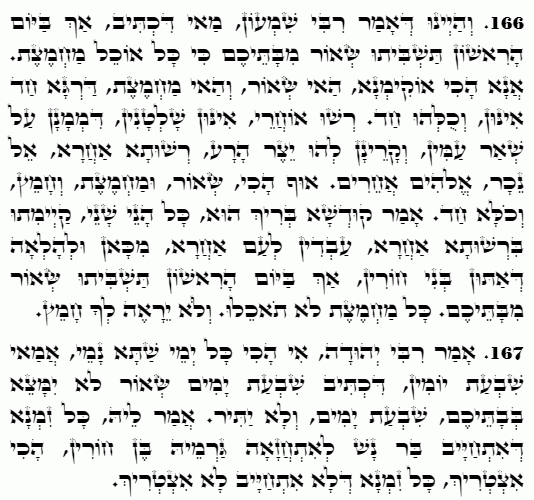Daily Zohar # 4766 – Bo – For seven days, show your freedom
Daily Zohar 4766

Hebrew translation:
167. אָמַר רַבִּי יְהוּדָה, אִם כָּךְ אָז גַּם כָּל יְמֵי הַשָּׁנָה, לָמָּה שִׁבְעַת יָמִים, שֶׁכָּתוּב שִׁבְעַת יָמִים שְׂאֹר לֹא יִמָּצֵא בְּבָתֵּיכֶם, שִׁבְעַת יָמִים וְלֹא יוֹתֵר? אָמַר לוֹ, כָּל זְמַן שֶׁהִתְחַיֵּב אָדָם לְהַרְאוֹת אֶת עַצְמוֹ בֶּן חוֹרִין – כָּךְ צָרִיךְ. כָּל זְמַן שֶׁלֹּא הִתְחַיֵּב – לֹא צָרִיךְ.
.
Zohar Bo
Continued from previous DZ
#166
Rabbi Shimon said: What is meant by the verse, “אַךְ בַּיּוֹם הָרִאשׁוֹן תַּשְׁבִּיתוּ שְּׂאֹר מִבָּתֵּיכֶם”—”Indeed, on the first day you shall remove leaven from your houses, for anyone who eats leavened bread” (Exodus 12:15)? I have explained it in this way: This “leaven” (שְׂאוֹר) and this “leavened bread” (מַחְמֶצֶת) are one and the same level; they are all one entity. “Another domain” (רְשׁוּת אַחֶרֶת)—these are the ministers appointed over the other nations. And we call them the evil inclination (יֵצֶר הָרָע), another domain (רְשׁוּת אַחֶרֶת), a foreign god (אֵל נֵכָר), and other gods (אֱלֹהִים אֲחֵרִים).
Here, too, leaven, leavened bread, and chametz (חָמֵץ)—all are one. The Holy One, Blessed be He, said: For all these years, you stood under another domain, serving another nation. From now on, as you are free people, “אַךְ בַּיּוֹם הָרִאשׁוֹן תַּשְׁבִּיתוּ שְּׂאֹר מִבָּתֵּיכֶם” “on the first day you shall remove leaven from your houses” (Exodus 12:15). “כָּל מַחְמֶצֶת לֹא תֹאכֵלוּ” “No leavened bread shall be eaten” (Exodus 12:20), and “וְלֹא יֵרָאֶה לְךָ חָמֵץ” “no leaven shall be seen by you” (Exodus 13:7).
#167
Rabbi Yehuda said: If so, why do we not refrain from eating chametz all year round? Why only for seven days, as it is written: “שִׁבְעַת יָמִים שְׂאֹר לֹא יִמָּצֵא בְּבָתֵּיכֶם” “For seven days leaven shall not be found in your houses” (Exodus 12:19)? Only for seven days and no more?
He answered: During the time that a person is obligated to show themselves as a free individual, they must refrain from eating chametz. At other times, when one is not obligated to demonstrate this, there is no need to prohibit chametz.
Notes:
The command to remove chametz during Passover represents the spiritual act of purging one’s connection to impure forces, idolatry, and evil inclinations. It marks the transition from servitude to spiritual freedom. This prohibition is not required beyond these seven days.
{||}

 Previous: Bo
Previous: Bo

